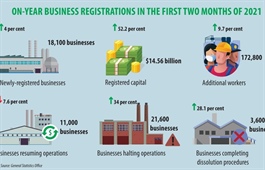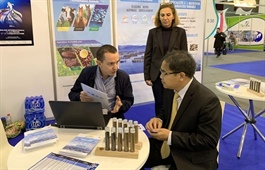Intriguing changes on capital contribution outlined in fresh enterprises legislation
Intriguing changes on capital contribution outlined in fresh enterprises legislation
The Law on Enterprises 2020 took effect on January 1 and supersedes the Law on Enterprises 2014. In comparison, the Law on Enterprises 2020 is assessed to comprise of many significant changes.

Nguyen Thanh Ha Lawyer, SB Law.
|
Two changes that should be most interesting for foreign investors were the assets contributed as capital and the time limit for capital contribution in limited liability companies with two or more members. These regulations are expected to make notable changes on the market, from the perspective of both enterprises and state management.
Under the Law on Enterprises 2014, assets contributed as capital could be in the form of VND, freely convertible foreign currencies, gold, the value of land use rights, the value of intellectual property rights, technologies, technical know-how, and other assets that can be valued in VND. Only individuals and organisations that were lawful holders of the above-mentioned rights could use such assets for capital contribution.
Article 34 of the Law on Enterprises 2020 stipulates that assets contributed as capital shall be in the form of VND, freely convertible foreign currencies, gold, land use rights, intellectual property rights, technologies, technical know-how, and other assets that can be valued in VND. Only individuals and organisations that are lawful owners or have lawful use right of assets prescribed in Clause 1 of Article 34 have the right to use such assets for capital contribution in accordance with the laws.
Therefore, in comparison with the provisions on assets contributed as capital outlined in both laws, the Law on Enterprises 2020 has changed the terms “value of land use rights, value of intellectual property rights” into “land use rights, intellectual property rights”. This change is in line with the nature of rights of property according to the provisions set out in the Civil Code 2015.
Regulation on assets contributed as capital under the Law on Enterprises 2020 have changed from “only individuals and organisations that are lawful owners” to “only individuals and organisations that are lawful owners or have lawful use rights”. Lawful owners set forth herein is construed as individuals and organisations that have the lawful right to own property.
Individuals and organisations that have lawful use right specified herein are not the owners but have the right to use the property as agreed by the owners or in accordance with regulations stipulated by laws. Therefore, the Law on Enterprises 2020 has broadened the subjects used for capital contribution in comparison with the 2014 version of the law. Foreign investors should pay attention to this regulation upon contributing capital to enterprises in Vietnam.
Under the Law on Enterprises 2020, the time limit for capital contributions has not been changed (within 90 days after the enterprise registration certificate is granted). Nevertheless, it clarifies that this time limit excludes the time of transporting and importing assets contributed as capital and performing administrative procedures to transfer the ownership of assets.
This new provision may assist investors to avoid violating regulations on the time limit for capital contribution due to taking too much time to implement procedures for importing, transporting, and transferring the ownership of assets contributed as capital. However, the crucial point here is when do capital contributors have to commence the aforesaid procedures? We can determine this with the expiration date which is based on the time limit without commencement date. In addition, it is easy to take advantage of this regulation and extend the time limit for capital contributions such as registering capital contribution with very small amounts of money, with tremendous assets.
Registered capital can be enormous, but the de facto capital contributed within the first three months can be very small. Otherwise, enterprises may register small initial capital contributions and then greater additional ones as the Law on Enterprises 2020 sets no time limit for these.
Furthermore, within 90 days after the enterprise registration certificate is granted in case any capital contributors fail to contribute or insufficiently contribute capital as committed, enterprises shall register for the adjustment of its charter capital and capital contribution ratios of the members according to the paid-in capital amount within 30 days from the last date the charter capital was due to be contributed in full. Under Clause 4 of Article 48 of the Law on Enterprises 2014, the time limit previously was 60 days.
If an enterprise fails to register for the adjustment of its charter capital within 30 days as aforesaid, the enterprise will be fined according to the provisions outlined in Clause 3 of Article 28 of Decree No.50/2016/ND-CP.
Accordingly, a fine of VND10-20 million ($430-870) shall be imposed for failure to register changes to the business registration authority when charter capital is inadequately contributed as registered. Investors should concentrate on this to avoid incurring penalties upon contributing capital to limited liability companies with two or more members.
The law has amended and supplemented regulations to be more consistent with reality. It also creates a favourable investment and business environment, concurrently in line with global trends. Nevertheless, enterprises need to be carefully instructed on risks that may arise.






















